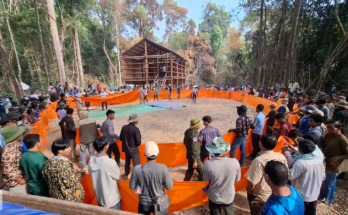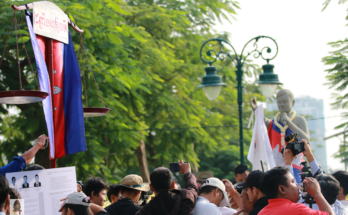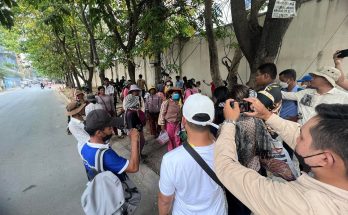CIVIL SOCIETY STATEMENT
ON STRENGTHENING AICHR’S MANDATES ON PROTECTION
Jakarta, 10 July 2011
1. On the occasion of the 44th ASEAN Ministerial Meeting (AMM) which will be held in Bali on 16-17 July 2011, we, civil society organizations (CSOs) from Cambodia, Indonesia, Lao PDR, the Philippines, Singapore, Thailand, and Viet Nam working on human rights and fundamental freedom in Southeast Asian countries, gathered together in Jakarta, Indonesia on 9-10 July 2011, to discuss issues related to the strengthening of the ASEAN Intergovernmental Commission on Human Rights (AICHR)’s mandate on promotion and protection.
2. We acknowledge the progress and development of AICHR from its establishment on 23 October 2009 and notice that there is lack of awareness amongst the people of ASEAN region about its existence, its mandates and functions. During our deliberation, we shared the views of the importance of AICHR as a fundamental actor to the ASEAN community-building process, and as a vehicle for progressive social development and justice and the full realization of human dignity and the attainment of a higher quality of life for ASEAN peoples, as stated in Cha-Am Hua Hin Declaration on the Intergovernmental Commission on Human Rights.
3. We affirm the role of AICHR as the overarching institution of regional cooperation in human rights but note our concern that there are urgent challenges to human rights in the region that threaten ASEAN community building such as:
- The recent arrest of peaceful demonstrators calling for election reform in Malaysia;
- migrant workers rights particularly women migrant workers and human trafficking;
- lack of respect for freedom of expression and association particularly laws restricting civil society organization and activity; such as the current development of the drafting of NGO and Association Law in Cambodia;
- failure to protect the right to land, housing, and livelihood in the pursuit of economic development and cultural identity especially ethnic minority and indigenous peoples;
- weak rule of law and a widespread culture of impunity underpinning arbitrary arrest, torture, forced disappearance, unfair trial, and lack of access to justice for marginalized and vulnerable groups;
- criminalization and/or discrimination of minority groups based on religion or beliefs, sexual orientation, gender identity, and ethnicity;
- inadequate support services to address violence against women (VAW) in the region, either individually or collectively;
- lack of respect to the rights of people with disability including their involvement in the policy making process, election, and equal treatment to develop their independent living
4. We stress the importance of the effective operation of AICHR through establishing a permanent mechanism for engagement, dialogue, and consultation with CSOs at national and regional levels in the implementation of its mandates and work plan pursuant to the Cha-Am Hua Hin Declaration and recognizing the crucial role that such organizations play in full realization of human rights.
5. We envision that AICHR should evolve to be a credible, forward looking, independent, and effective regional human rights mechanism in ASEAN region. We believe that AICHR should have its own dedicated secretariat to effectively support its promotion and protection mandates and functions. We consider that AICHR should establish permanent sub-committees to address urgent or ongoing regional human rights issues.
6. We strongly stress that ASEAN Human Rights Declaration will comply with International Human Rights Standards.
7. As part of its responsibility of being an overarching institution, AICHR should ensure that the ASEAN Human Rights Declaration is adhered to and adopted by other sectoral bodies, including the economic, political, socio-cultural, and other aspects of ASEAN for human rights cooperation. Therefore, the sectoral bodies shall consult the AICHR for effective promotion and protection of human rights.
Agreed by 18 civil society organisations in Jakarta, Indonesia on 10 July 2011.



